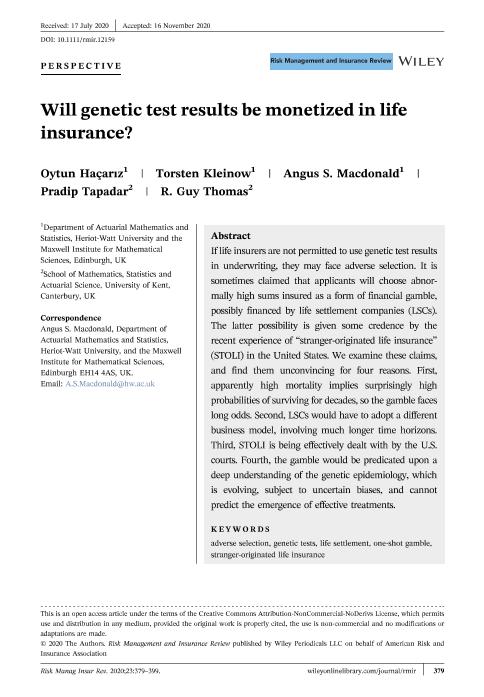Will genetic test results be monetized in life insurance?

Contenido multimedia no disponible por derechos de autor o por acceso restringido. Contacte con la institución para más información.
| Tag | 1 | 2 | Valor |
|---|---|---|---|
| LDR | 00000cab a2200000 4500 | ||
| 001 | MAP20210002335 | ||
| 003 | MAP | ||
| 005 | 20210126164036.0 | ||
| 008 | 210126e20201201usa|||p |0|||b|eng d | ||
| 040 | $aMAP$bspa$dMAP | ||
| 084 | $a341 | ||
| 245 | 0 | 0 | $aWill genetic test results be monetized in life insurance?$cOytun Haçarýz...[et al.] |
| 520 | $aIf life insurers are not permitted to use genetic test results in underwriting, they may face adverse selection. It is sometimes claimed that applicants will choose abnormally high sums insured as a form of financial gamble, possibly financed by life settlement companies (LSCs). The latter possibility is given some credence by the recent experience of stranger-originated life insurance (STOLI) in the United States. We examine these claims, and find them unconvincing for four reasons. First, apparently high mortality implies surprisingly high probabilities of surviving for decades, so the gamble faces long odds. Second, LSCs would have to adopt a different business model, involving much longer time horizons. Third, STOLI is being effectively dealt with by the U.S. courts. Fourth, the gamble would be predicated upon a deep understanding of the genetic epidemiology, which is evolving, subject to uncertain biases, and cannot predict the emergence of effective treatments. | ||
| 650 | 4 | $0MAPA20090004726$aTests genéticos | |
| 650 | 4 | $0MAPA20080570590$aSeguro de vida | |
| 650 | 4 | $0MAPA20080582661$aSelección adversa | |
| 650 | 4 | $0MAPA20080586294$aMercado de seguros | |
| 700 | 1 | $0MAPA20210001383$aHaçarýz, Oytun | |
| 773 | 0 | $wMAP20077001748$tRisk management & insurance review$dMalden, MA : The American Risk and Insurance Association by Blackwell Publishing, 1999-$x1098-1616$g01/12/2020 Tomo 23 Número 4 - 2020 , p. 379-399 |

